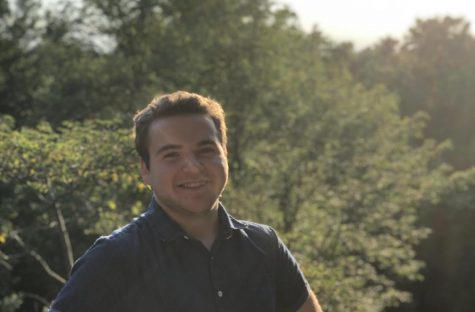We are adjectives, not nouns
A hand model expressing the contemplation of the dimensions of self
Sep 11, 2022
Take a second and look down at your hands. They’re probably holding a phone, on the keyboard or your laptop. Are these hands really you? What if you had lost your hands in an accident, would you still be you?
What part of you is really you? What part of you, if it was removed, would you believe that you were no longer you? Maybe you say the brain, but what about your brain makes it you? Are you your abilities, skills, talents, knowledge and memories? Your personality?
But doesn’t personality change over time? If your personality were to change after a traumatic brain injury, would you still be you?
Of course! It might be you with a different personality than you had before, but it would still be you.
But maybe it doesn’t have to be so drastic. Think about the “you” from middle school. What about you from high school? What about you now? Those people are probably all different, but they’re all still you.
And what about memories? Aren’t we made up of our memories?
When my dad was suffering from brain cancer, we often had to remind him of certain words or phrases because he couldn’t remember them or how to make the sounds. People who are suffering from dementia often can’t remember who their family is or sometimes who they are. Without my memories, however precious they may be to me, would I still be me?
The things that you think make you who you are end up only being parts of who you are, but none of these things alone is you.
Sometimes we see ourselves as our beliefs, making us very tribalistic, only focused on if someone agrees with us or not. Do they root for the same sports team? Do they vote for the same political party? Do they eat at the same restaurants? Do they send their kids to the same school?
But those beliefs and preferences are not who we are either. Our beliefs can change over time and our understandings of our preferences change as well.
In a car, if you removed one part, would it still be a car? Would it still work? No one lone part is “the car,” but rather the sum of all the individual parts creates a car. There is no ‘you’ without all of the ‘parts’ of you. We are who we are because of each of the individual parts of us, but no one individual part is us.
When we think of ourselves and the people around us, we tend to think of ourselves and others as permanent, fixed entities, and oftentimes we associate certain labels and assumptions with those people as permanent, fixed entities.
We tend to think of people as nouns, as concrete people who don’t change much. Immediately, when you look at someone, you likely make a snap judgment based on their appearance, or their reputation, and create a profile of that person. “They’re from Cleveland Heights so they’re obviously rich and selfish!”
Then, when we see the person behave more in certain ways, we might affirm our beliefs about them. “They come in with Starbucks every day!” When we make a label for someone, we do not give them the chance to really show who they are.
Oftentimes, however, our snap judgments and concrete assumptions about people are confronted. Our Opinion Editor, Eric Fogle, wrote about something like this, see “Another way to think about horrendous coworkers.”
Of course, the true reality of ourselves is that we’re constantly in a state of change, all the time. Fogle tells me that “identity is an endless reconsideration,” and he’s absolutely right. We are who we are because of the things around us and the things that make up who we are. We are not one noun, but rather many adjectives constantly changing and developing with us as we grow and change.
I could say “I am a college student,” as a noun, but that restricts me only to being a college student when I am really much more than that.
Consider if I said “I am a college student” as an adjective describing what I really am, a human being who is enrolled in college. I’m not just a college student but rather I am a human made up of the things around me and within me that make me who I am.
Think about the way we use labels in our society. We label ourselves and others all the time. I’m a Democrat. I’m a Republican. I’m a Christian. I’m an atheist. I am dumb. I am smart.
We use these labels as if they are permanent, fixed things that make us who we are. However, like the parts of a car, we are who we are because of the countless things that make up who we are. We develop our beliefs based on our society, our genetics come from our parents, our opportunities come from our environment. These things are part of how we are, but they are not what we are.
The problem comes when we begin to use these labels as nouns instead of adjectives. When I use a label like, “I am a Democrat,” as a noun, then it separates me from everyone and everything that is not Democratic. Interpreted as a noun, that label divides and separates. Now consider that label as an adjective, and it simply becomes a way to describe how I as a human being interpret political issues.
No matter how you look at it, you will always be a human being, and the most central part of being human is that we are constantly changing. The labels that we give out are just descriptions of our current humanity. “Identity is an endless reconsideration.”
Over the summer, some friends and I were hiking down in the Cuyahoga Valley, and during the hike, I noticed one tree with a strange curve in it. We see trees all the time, oak, pine, bendy, straight, but it’s always just a tree. We can think about how it might have curved to receive more light, or buckled under the weight of snow, or withstood strong winds. We simply appreciate the tree for what it is.
Yet we lose that when we look at people. It’s easy to judge the labels that we perceive, but what if we could appreciate people the way that they are like we admire the trees? We can appreciate human beings for being human, like we appreciate trees for being trees.
Look down at your hands again, and think of the labels that you place on yourself. Then look at others, and think about the labels that you place on them, and how you judge those labels. Challenge yourself to see the people around you simply as human beings, filled with diverse descriptive adjectives.













